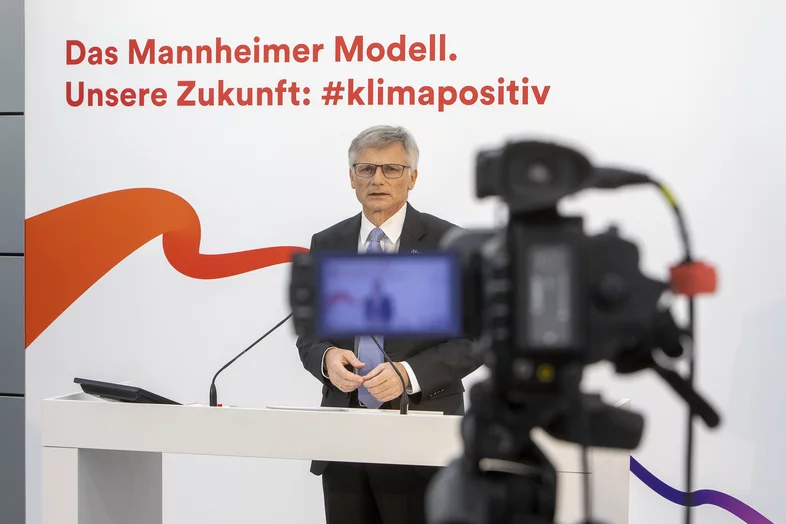MVV heads for climate positive future with “Mannheim Model”
Energy company MVV is promoting the energy turnaround with its “Mannheim Model” and thus making a major contribution to meeting the Paris Climate Agreement – MVV is set to become climate neutral by 2040 and even climate positive from 2040 – MVV’s CEO Dr. Müller: “With our ‘Mannheim Model’, we aim to be one of the first climate positive energy companies.”
MVV Energie AG, one of Germany’s leading energy companies, is further stepping up the pace as it heads for climate neutrality. As announced at a press conference today, by 2030 the energy company already aims to achieve a reduction in CO2 of at least 80 percent compared with 2018. “And we intend to go even further. By 2040, we aim not just to be climate neutral: after 2040, our future will even be ‘climate positive’. That means we will be removing greenhouse gases from the atmosphere”, stressed MVV’s CEO, Dr. Georg Müller.
To achieve this, the energy company will be promoting the electricity turnaround and the associated expansion in renewable energies, as well as supporting its customers in their efforts to decarbonise their activities. Above all, it will be pressing ahead with the heat turnaround. MVV has named this approach the “Mannheim Model”. “The heat turnaround is possibly the most important lever enabling MVV to reach climate neutrality”, explained Dr. Müller and added: “MVV will now make its proprietary district heating activities in Mannheim and the region climate neutral far more quickly than previously planned, namely during the current decade already”. MVV is thus adding further momentum to its efforts to protect the climate.
One million tonnes of CO2 saved five years earlier than planned
Given the political framework for climate protection in Germany and the European Union, MVV believes that it is once again acting as a pioneer. MVV has made climate protection and the energy turnaround its clear guiding principles. According to Dr. Müller, MVV views the decarbonisation of business and society as a crucial task in which the energy industry, as one of the largest sources of emissions, has a particularly important role to play. Expanding renewable energies, e-mobility, the heat turnaround, smart cities – these all need energy and that can only work by using climatefriendly technologies.
The ten-year targets MVV set itself in 2016 to achieve by 2026 were also based on the principles outlined above: Specifically, these included targets to double its proprietary renewable generation capacity portfolio by 2026, to install 10,000 megawatts of renewables-based generation capacity, to make its own administration activities climate neutral and to save one million tonnes of net CO2 emissions by 2026. “We reached the target of saving one million tonnes of net CO2 emissions this year already, five years ahead of the original deadline”, announced the CEO.
Heat turnaround as centrepiece of measures to achieve climate neutrality
As the third-largest German district heating company, the MVV Group supplies district heating not only to Mannheim and parts of the Rhine-Neckar metropolitan region but, via its subsidiaries, to the cities of Kiel and Offenbach as well. Nationwide, warm water and heating in buildings still account for more than one third of Germany’s CO2 emissions. MVV is gradually making its district heating green and will fully convert its district heating activities in Mannheim and the Rhine-Neckar metropolitan region to green energy sources by 2030 at the latest.
“We face the forward-looking task of reinventing district heating”, explained Dr. Müller. “At MVV, we are building on the broadest-based green electricity and heat portfolio of any Germany energy company. This draws on waste heat from waste and biomass incineration, the use of sewage sludge and regenerative energies such as biomethane, river heat pumps and new possibilities in the areas of geothermal energy and waste industrial heat.”
Contribution to meeting Paris Climate Agreement
With its strategic alignment, MVV is clearly committed to the targets set out in the Paris Climate Agreement. To achieve these, alongside the conversion in its district heating supply and the development of customer-based solutions the energy company is also pressing consistently ahead with the coal exit already resolved by the government. Emissions from conventional generation positions are gradually being reduced to zero. MVV is also maintaining a high pace of expansion for renewable energies used to generate electricity and green heat. Having already doubled between 2010 and 2016, the volume of electricity generated on the basis of regenerative energies is set to double again by 2026.
“Mannheim Model”: MVV to become climate positive from 2040
“Germany aims to be climate neutral by 2045. MVV has set itself the goal of becoming climate neutral by 2040 already. But that will not mark the end of our journey in Mannheim. We will rather be going one step further. We are looking beyond 2040 and then even aim to become climate positive”, declared Dr. Müller. For this reason, in the long term MVV will decarbonise its energy from waste plants with CO2 capturing and thus turning these plants into CO2 sinks.
To meet its climate protection targets, MVV is drawing on all available green future technologies and options, added the CEO: “At MVV, we refer to our course towards a climate positive future as the ‘Mannheim Model’. With this model, that will become exemplary for many cities and municipalities in Germany and Europe, we aim to be one of the very first ‘climate positive’ energy companies.”


